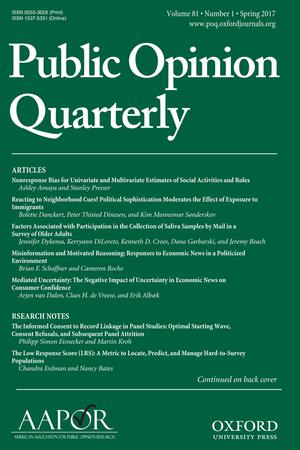Public Opinion Quarterly
ISSN: 0033362X, 15375331
Oxford University Press
Deadline: Tue, 14 Mar 2023
Contact: nicholaskerr@ufl.edu


We seek contributions that advance our collective knowledge on public trust in elections and electoral institutions - broadly conceived to include studies of legitimacy, confidence, and related constructs. Research on all countries is welcome.
Motivation: Elections are central institutions in participatory democracies but remain logistically challenging and potentially divisive events. While the quality of elections varies significantly within and between countries, there is no one-to-one relationship between objective measures and citizens' perceptions of electoral legitimacy or the extent to which they trust elections or the institutions that organize them. Establishing free and fair elections is not enough; public confidence and trust in elections is equally crucial to legitimize democracy and reduce inter-group political conflict. Recent elections and citizen experiences in the United States, Honduras, and Kenya, countries that are markedly different, have shown how the legitimacy of elections often becomes politicized, with devastating consequences that continue to matter long after the ballots are counted, and winners announced. On the other hand, blind trust in elections and the outcomes produced in the presence of serious manipulation is equally problematic. Such trust may provide de facto authoritarian regimes undeserved democratic legitimacy and longevity.
The special issue scope: This special issue will advance our collective knowledge on public trust in elections and electoral institutions - broadly conceived to include studies of legitimacy, confidence, and related constructs. We invite contributions that address both the causes and possible effects of public trust in elections. Possible topics may include how central institutions and actors, such as courts, electoral management bodies, and international and domestic monitors, shape public trust in elections, but also how contemporary trends such as "fake news," the diffusion of mis-and disinformation, racial and economic inequality, and political populism erodes it. We
are also interested in how electoral trust may affect political behavior such as voting, political violence, and popular mobilization. We hope that the special issue will bring together scholarship from widely different democratic (or electoral authoritarian) contexts, representing the Global North and South. We will consider both original articles and research notes.
Methodological pluralism: We encourage contributions based on different methodological approaches to public opinion research, both quantitative and qualitative. We will consider high-quality scholarly contributions that use single-country or cross-country designs, including work leveraging different forms of data such as observational surveys, experiments, big data, interviews or focus groups. We also have interest in more conceptual or methodological contributions advancing our knowledge on how to conceptualize, measure, and analyze electoral trust and legitimacy. POQ promotes transparency and replicability. All authors should consult POQ's open science and replication policies before preparing their submission.
How to submit:
Authors should submit manuscripts using the POQ submission platform. Manuscripts should be uploaded at https://mc.manuscriptcentral.com/poq no later than March 14, 2023. To ensure consideration in the special issue, authors must include a cover letter that clearly states that the manuscript has been submitted for consideration for the "Trust in Elections Special Issue." Submissions will be initially screened by the editors, with suitable papers advanced to peer-review in accord with standard journal practice.
Queries about this special issue should be directed to the guest editors using the subject line "Trust in Elections Special Issue.”
Nicholas N. Kerr, University of Florida (nicholaskerr@ufl.edu)
Bridgett A. King, Auburn University (bak0020@auburn.edu)
Michael Wahman, Michigan State University (wahmanmi@msu.edu)











